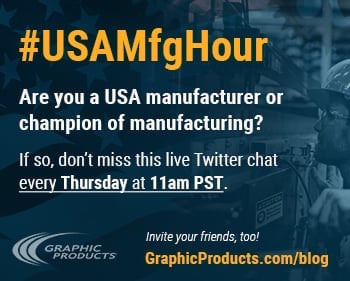Facing Hard Truths by Embracing Soft Skills
03
February,
2023
9 MINUTE READ

Communication, teamwork, creativity ? it's these types of soft skills that companies look for in a candidate, but they are also a reflection of the company's true values. Soft skills can be just as important as hard skills for success, change, and a progressive future. Marketing Director John Buglino of Optessa, an advanced planning and scheduling software company, hosts a discussion on soft skills for #USAMfgHour on Twitter.
Personal and Professional Strengths
A resume and a quick internet search can often show what hard skills someone has, but the soft skills are not necessarily measurable by a degree or certificate. There are 10 top soft skills in demand for today's business needs, according to several career sites. There are:
- Communication
- Organization
- Teamwork
- Punctuality
- Critical Thinking
- Social Skills
- Creativity
- Interpersonal Communication
- Adaptability
- Friendliness
At the core, what are soft skills and why do they matter to an organization?
"They are not measurable but things like your personality or the attitude you bring to work with you each day," said Gina Tabasso of Dar-Tech, a chemical distributor. "Who we are represents the company and can make or break the culture and environment."
"How you communicate and engage/relate to your team or co-workers," said Shannon Simpson of DuraTech, a custom graphics manufacturer.
"Soft skills are interpersonal and behavioral skills such as communication and adaptability," said Rebecca Hart of Drive Source International/Dynamatic, a manufacturer of eddy current variable speed solutions. "I've worked with people who don't have good soft skills and they don't last in a company."
"In short, soft skills are basic communication & social skills that enable someone to communicate effectively and build quick rapport! The better your soft skills, the more memorable you are," said Carita Hyman of 360 Outcome, B2B Sales Support.
"I usually equate them to People Skills and Problem Solving," said Nick Rivers of Obsidian Manufacturing, owner of Arter Precision Grinding Machines, MagnaLift, Magna-Lock, and Power-Grip.
"Your manners and ability to get along with your coworkers and customers," said Julianne Schaub of Striven, business management software. "Without them, your work environment could become toxic, stressful- which could lead to ineffective communication."
"I think the reason they matter is that they give an organization character and realism. My definition of soft skills is an employee's personality, sense of responsibility, manners, attitude, and flexibility. What really motivates them and their integrity," said Sue Nordman of Obsidian.
"Soft skills are the ?emotional quotient' skills - interpersonal connections, teamwork, communication - that often get overlooked by #manufacturing teams when hiring. In a digital world, getting along is important," said Dave Meyer of BizzyWeb, inbound marketing.
"I've always understood them as the things that make you ?easy to work with' like communication, personality, attitude, etc. Interested to hear if I'm way off here," said Nicole Kangos of Snaptron, tactile done switches.
Soft skills relate to how you work, Buglino of Optessa said. "They are a combo of people, social, and communication skills + personality traits, attitude, and mindset of an individual."
Which soft skill is most critical to your organization's success? Why?
"That would be communication as many of the projects that we work on are very detailed," said Dan Bigger of Chenango Valley Technologies, a custom injection mold company. "We all have to work together and communicate so we get the project right, the first time"
"Empathy. Being able to empathize with the customer and with each other, especially over the past year. It's what has held us together I think," said JD Allen of Cleveland Deburring, a machining company.
"Definitely, communication," said Striven. "We need it between divisions and smaller teams as well as with our customers to improve our product and address opportunities quickly. Being empathetic is also a big one."
"Being a team player and customer service mentality. We are like a family," said Dar-Tech.
"Communication is most critical. If you're not good at communicating what you want/need/see/feel, then you're inviting debate and conflict, IMO," said DSI/Dynamatic.
"Communication-both internally as well as externally," said Julie Basello of Radwell International, industrial automation equipment. "I think that is the basis of doing business for us is creating open lines of communication within the organization and with our customers."
"Exhibiting a positive attitude to help engage and energize your team," said DuraTech.
"Personally, it would be integrity. If they have that, everything else will flow well from that," said Sue Nordman.
"Of course, for a marketing agency, the top skill for us is communication," said Meyer. "Our teams are sending emails, writing inbound content, optimizing PPC ads, and much more - all day long."
"The goal is for everyone to be on the same page, strive for organizational goals and like working with each other," said sales and marketing professional Phil Samuels. "If you like your associates, you want to please them by doing a good job!"
"The most important soft skill in my organization is ethical decision-making! If an employee has a great moral compass, the path for everything else is set," said 360 Outcome.
"I would say either communication or just a good attitude," said Ben Nordman of Obsidian. "A breakdown of either can have a ripple effect through the whole organization."
"Ability to have a sense of the situation and respond would be most critical for the customer-facing organizations," said Sam Gupta of ElevatIQ, a technology and management consulting firm.
"Tough to narrow down amongst the list of soft skills," said Buglino. "Communication is crucial in our organization. Our team is in constant communication as it relates to the needs of our clients, improving the software, & chipping in to support one another."
How do you identify soft skills during an interview?
"I think body language and demeanor can be very telling during an interview," said Radwell. "Also asking Behavioral type questions related to conflict and problem solving is a good way to gauge where someone is at with certain soft skills."
"Just how a person carries themselves, how they react and how they talk," said CVT. "You can get a good feel for people just with how they communicate verbally and nonverbally. Some people just have ?IT'."
"We try to interview for soft skills at BizzyWeb by having our top candidates all join an interview together for a group chat," said Meyer. "Especially helpful for sales reps and other positions who need to verbalize and think on their feet."
"Have real conversations to get to know the person. See what makes him/her tick. Behavioral interviewing questions," said Dar-Tech.
"I look for confidence, personable communication, eye contact, and the ability to express genuine emotion. These are things that our customers will notice as well and will genuinely respond to," said 360 Outcome.
"Great question! It's a bit of gut feeling plus how people answer questions," said DSI/Dynamatic.
"Open-ended questions allow for the candidate to speak on their experiences and behaviors," said Robert Romo of Crescent Software, Sage software for the food industry. "Often times you can determine a person's soft skills by how they would react or have reacted in certain situations."
"Speaking as an employer, I think you need to be able to read people well. Not judge, but have the ability to hear them during the interview process and by reading their resume. Really get into their shoes. Sometimes I'm off, but this usually works for me," said Sue Nordman.
"It's an instinct that develops with time and experience. At least that's what happened to me. I got very good at it as time went on and I had more and more interactions," said Radwell.
"I think it's effective to describe a recent situation and ask them how they would respond. The hypothetical situation may catch them off guard and you might get a less rehearsed response," said Samuels.
"One way is by asking the RIGHT questions that will indicate soft skills," said Ruby Rusine of Social Success Marketing, a B2B marketing service.
"Ask for specific examples, or open-ended questions to allow for them to share. Also, how candidates or customers treat you and/or other co-workers are present," said DuraTech.
"Making sure to ASK the right questions! Soft skills are very important in the fit between potential employee and employer and making sure to find those before hiring them is key," said Obsidian.
"I've done a fair share of interviewing in for theatre-related jobs," said Striven. "From my experience, I see folk's soft skills not in their audition, but in how they treat people in the room. How they hold a conversation as themselves."
"The way a person answers questions will tell you a lot. I like to put them in a scenario and see how they respond," said Rivers.
"Read between the lines," said Kirsten Austin of DCSC, a warehouse/supply chain management software company. "Pay attention to how they respond to emails, pay attention to if they show up on time, monitor how enthusiastic and passionate they seem for work."
"Yes, I mean, we all need to be humans and have a bit of empathy, but that doesn't mean that the candidates can take interviews for granted. I look at multiple variables or signals before making a judgment call if someone is an A player or not," said Gupta.
"Is your interviewee making good eye contact? Are they attentive and engaged? Can they easily carry on a conversation?," Snaptron asked rhetorically.
"We use the STAR Method during our interviews," said Buglino. "Getting the (S)ituation, (T)ask, (A)ction, & (R)esult should give you indicators of their #softskills ? listen for communication, teamwork, problem-solving, & empathy with their answer."
Improving Interactions
As a leader, how can you help others develop soft skills?
"Leading by example is great. I think I developed a lot of my soft skills simply by being in an experience and being taught how to do things better when they failed. Failure often leads to success," said DSI/Dynamatic.
"Feedback and training. Give them tips. Show them examples of how-to and not to do certain things. Everyone can always get better if they are open to other opinions and feedback," said CVT.
"Pay attention. I think watching other professionals and seeing how they work is key to developing yourself. Also don't have too big of an ego to where aren't willing to learn from others," said Obsidian.
"Yes, osmosis is the best way to learn, especially soft skills. Some people are naturally good at it," said Gupta.
"It's best to model the behavior and attitudes that are important to your organization. You can also approach an associate privately to review a response that could be improved," said Samuels.
"Servant Leadership is a great way to lead. And be the person you want them to be like. Kind, respectful, good listener, encouraging, not authoritative, etc.," said DuraTech.
"Leaders model the behaviors they want. You need to walk the talk. My favorite ?boss' ran a fortune 100 bank (5th largest in the world) and knew the names of every employee he ever met. You need to care about your team and be willing to do the work," said Meyer.
"The best bosses I ever had (and have) were the best people. Kind, smart, respectful, caring, genuine. Just good people. Can't fake that," said Dar-Tech. "I just lead by example. I have a positive attitude and hope it rubs off on people who don't. I didn't always and someone who was my hero rubbed off on me. Pay it forward!"
"Lead by example and the golden rule. It's a soft skill helping people develop their own because no one wants to feel like they can't act like a human being," said Striven.
"Know your people first so you can assess where their strengths and opportunities lie and focus on things with them, specific to them, to help them grow," said Radwell.
"Well, I'm not going to lie, some employees are more work than others. I think a leader's attitude has to set the stage. Being a good role model says it all. Everyone has a bad day but show them how to recover from it. Apologize and take the high road. BE REAL," said Sue Nordman.
"I say, lead by example first. There is also plenty of online material and resources. Google has everything," said Radwell.
"You either possess certain soft skills or you don't ? if you find someone on your team that lacks certain skills, take the time to coach, train, and demonstrate ? lead by example," said Buglino.
What is the difference between communication & interpersonal communication?
"Communication is a broad word for any way to get a message across. Interpersonal communication is how we speak person-to-person," said DSI/Dynamatic.
"Communication is one-to-many... but interpersonal communication in today's world also needs to be able to scale. That email you just sent is going to be seen by others. You always need to include context and details in your communication, regardless of audience," said Meyer.
"Communication in this here would be general directives for multiple people delivered by email, group text, a speech, and so on. Interpersonal communication would be one on one and the discussion might include directions or could include mutual topics of interest," said Samuels.
Communication is your ability to convey a message to many people that is easily understood. Interpersonal communication is your ability to interact and speak with other people. Typically, is you to a few, even 1-to-1, said Buglino.
Will a business fail if it lacks leaders and employees with soft skills?
"I have to say, without a doubt, yes. You need leaders, not managers. They need to be able to communicate with their team and customers. The same with employees. It all has to tie together or the entire engine breaks down and eventually fails if not fixed," said CVT.

"Unfortunately, no. I have seen rude, terrible people become wildly successful," said Dar-Tech.
"Sadly, I have worked in companies where leaders had terrible soft skills and yet their business succeeded because of what they did. It happens. It also creates stress for people in that environment too," said Radwell.
"Well even a monopoly, eventually will fail if its employees lack soft skills, However, a small business will barely make it off the ground with employees that lack soft skills," said 360 Outcome.
"I guess it's not REQUIRED to fail, but a lack of leadership is often cited when businesses do fail. If your team is highly skilled and motivated on their own, you MIGHT get away with it," said Samuels.
"It won't necessarily fail if leaders lack soft skills, but you're not going to win a race with one foot on the accelerator and one on the brake," said Meyer.
"Yes, it could have devastating impacts. I think leaders really need to set the example and tone for the rest of the organization in terms of soft skills," said Snaptron.
"Absolutely," said Buglino. "Technical abilities can only get you so far. Soft skills are vital for any business looking to land, expand, and retain clients. Seems like the consensus is that while it is a poor situation, companies can go on, even thrive, amidst poor leaders."
Businesses and their people can learn more about soft skills and start making improvements today. Some of the tactics that can be used are through mentorships, books, and websites like Lynda.com.
"I like Simon Sinek's "Start With the Why" and I'm having my 14 yo daughter read "How to Win Friends and Influence People" by Dale Carnegie," said Meyer.
"One of the best resources is CharismaOnCommand on YouTube," said Gupta.
Look to those within your community that embodies soft skills you wish to develop or improve upon to advance your career. You can also research the topic online, said Buglino.
About #USAMfgHour
Anyone who champions U.S. manufacturing can join in on a new conversation each week on Twitter using the hashtag #USAMfgHour. The chat starts at 11 a.m. Pacific Standard Time/2 p.m. Eastern. Share positive blog posts, helpful articles, news, important information, accomplishments, events, and more with other manufacturers and supporters from throughout the country.
Are you interested in hosting a #USAMfgHour chat? Contact organizers @CVTPlastics, @DCSCinc, and @SocialSMktg.
RELATED RESOURCES

Technical Learning Systems in Manufacturing
There are various educational programs and resources available to help manufacturers attract and retain ...
Read
Keeping Your Digital Space Organized
Experts at Striven chat about unlocking productivity gains by creating and maintaining an organized digital ...
Read
Social Selling: Utilizing Social Media for Sales
Social media is fun, informative, and engaging. It also is a great tool for better B2B sales. Ben Nordman of ...
Read.png)


